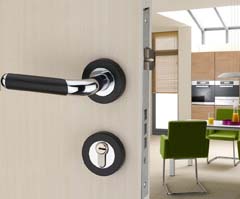
Cylinder lock
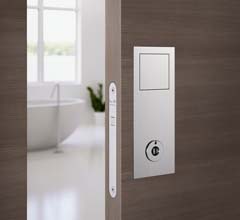
Sliding door lock
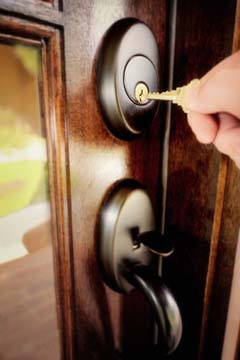
Deadlock
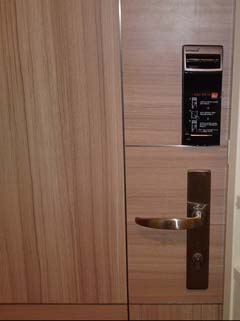
Mortise lock
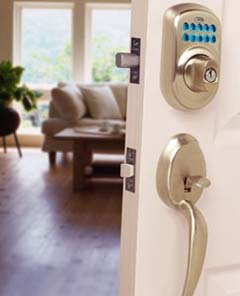
Keypad lock
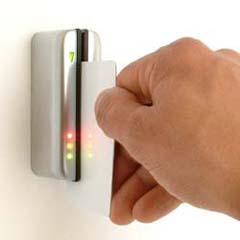
Swipe card lock
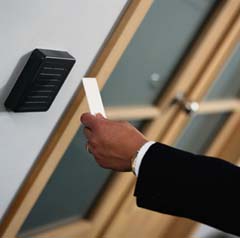
Electronic access lock
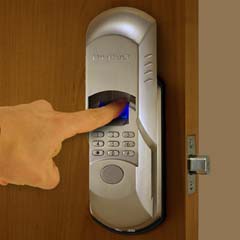
Biometric lock
Nothing is more important than the security of your home and family. As technology gets more sophisticated and more affordable the choices you have around types of locks for your home increase. In this article we'll give you a run down of the kinds of locks you may want to consider for your home - from standard key locks through to the latest in smart phone technology.
It's always a good idea to get an assessment from a professional locksmith as many things can impact your choice of lock including: style and material of your doors and windows, insurance requirements, location of your home (ie: crime rate), lifestyle and occupants of your home.
Single key or basic cylinder lock
Pros
A basic cylinder lock such as you would find in a door knob or level handle is usually inexpensive. However, as with most things in life, you get what you pay for!
Cons
Locks such as these can be 'picked', jimmied or broken. And also if an intruder breaks into your house via another means, these basic locks can make it easy for them open a door from the inside and exit easily - with a whole lot of your possessions!
Sliding door locks
Pros
Sliding doors provide wonderful ease of access, especially for 'indoor / outdoor' living where doors open directly onto a back decking or covered verandah area. You should always have a secure lock on your sliding door.
Cons
Many sliding door locks are very basic and make it easy for an intruder to 'lift' the door out of the sliding frame. It is worth investing in specialised keyed locks and install them at both the top and bottom of your doors. You can also reinforce sliding door locks with a thick piece of dowel in the bottom track or a bar that comes down from the door frame itself - both of these will prevent the door being forced open.
Deadlocks and deadbolts
Pros
A deadlock is a lock that requires a key unlock it from the inside or the outside. So if someone manages to get into your house they will not be able to simply open the door or window and exit easily. They will have to try and break the lock somehow, which is difficult and might attract unwanted attention. Make sure you purchase high quality metal locks and it is generally recommended that the bolt itself be at least 1 inch in length.
Deadlocks on all external doors and secure locks on all windows are usually the standard minimum requirement for most insurance companies.
Cons
A deadlock can still be 'picked' by an expert intruder. You must be careful not to lock yourself (or family members, especially children) inside without a key. This can happen if someone deadlocks the doors from the inside and then leaves the house while someone is still inside.
It's a good idea to keep a spare key inside the house somewhere. But please - nowhere obvious like a hall stand near the front door! And also - don't ever attached labels to keys that state what door they are for or your address. Never make life easy for a potential intruder.
Mortise locks
Pros
Mortise locks were more common in the past, before the development of cylinder locks that are more easily attached to a door. Mortise locks require that the lock be built into the door itself (lock body) with a strike plate (usually metal). The lock trim can be a range of mechanisms (knob, lever, handle set etc) and a keyed cylinder operates the actual locking and unlocking. Mortised locks are extremely strong and acts as both a door knob/handle and a deadbolt.
Cons
Drilling into a door (as is required when installing a mortised lock) can weaken the door. It is not recommended that you install mortised locks on your own. This is a job best suited to professional locksmiths who will do a tidy job.
Key control
Pros
This is where your keys cannot be copied at a standard locksmith or key cutter. The key has a code which means that authorisation is required to cut any new keys. You can control how many copies of keys to your home exist in the world and who has access to them.
Cons
Key control can make life more difficult in case of an emergency. An ordinary locksmith may not be able to help with a lock out so you will potentially have to wait longer or pay extra to get access to your home in the case of lost keys.
Push button or key pad locks
Pros
An electronic keypad with a code eliminates the need for keys. No more fishing around in your bag or worrying if you lose your keys, who might have access to your home! Most keypad systems are very sophisticated and come with a range of features including: change codes at any time, give different codes to different people who need specialised access (eg: house cleaner), additional benefits such as automated deadlocking, links to security company, reporting and online management.
Cons
The main drawback is that anything electronic relies on electricity. So in case of a power outage you would need a back up generator on site or a back up plan of how to get access to your home. Also there is the possibility that expert hackers could hack your code and gain access to your home.
Electric swipe / strike locks
Pros
These are also sometimes known as RFID (radio frequency identification). The basic mechanism is a swipe card. This offers a high level of security and is more common for workplaces / office buildings than residential homes.
Cons
Providing swipe cards to whoever might need to access your home can be a challenge. Also many doors on standard residential homes are not suitable for the mechanism that needs to be installed for this kind of lock.
Smartphone
Pros
Smartphone door locks are likely to become more and more common. There are already a number of options to choose from that will do anything from automatically unlock and lock doors once you (and your phone) are within a certain range, through to operating locks and changing systems remotely from anywhere in the world where you have access to the internet. You can also set up reporting and monitoring with security companies.
Cons
You don't want to lose your phone (although most systems will have back ups onto your computer or other device). This technology might be an issue in a family home or shared household situation where not every person has easy access to a smart phone.
Biometric
Pros
If you're a fan of Bond films or science fiction you will have seen locks activated by biometrics such as retinas or fingerprints. This is extremely sophisticated technology that is most appealing because it is so unique (no two finger prints are the same!) and so easy (you always have your eyes and fingers with you).
Cons
It's a pretty extreme system to set up for residential home security, especially if you have a number of different people coming and going. And of course, it is not cheap or easy to install so you'll need to pay to have a qualified professional take care of things for you.
About the author
This article was written and provided by Five Star Locksmiths who are based in Melbourne, Victoria. Five Star Locksmiths provide 24 hour locksmith services in Melbourne's CBD and its suburbs.
